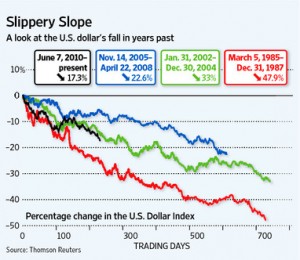
Bottom line: ignorant government policies, and particularly the mandating of corn's use to make ethanol, have driven the price of corn up for real people who want to each corn and products containing corn (which turns out to be just about everything).
It's Getting Harder to Bring Home the Bacon
By MARY KISSEL, April 30, 2011
Wall Street Journal
C. Larry Pope, CEO of the world's largest pork producer, explains why food prices are rising and why they are likely to stay high for a long time.
It's also a business under enormous strain. Some “60 to 70% of the cost of raising a hog is tied up in the grains,” Mr. Pope explains. “The major ingredient is corn, and the secondary ingredient is soybean meal.” Over the last several years, “the cost of corn has gone from a base of $2.40 a bushel to today at $7.40 a bushel, nearly triple what it was just a few years ago.” Which means every product that uses corn has risen, too—including everything from “cereal to soft drinks” and more.
What triggered the upswing? In part: ethanol. President George W. Bush “came forward with—what do you call?—the edict that we were going to mandate 36 billion gallons of alternative fuels” by 2022, of which corn-based ethanol is “a substantial part.” Companies that blend ethanol into fuel get a $5 billion annual tax credit, and there's a tariff to keep foreign producers out of the U.S. market. Now 40% of the corn crop is “directed to ethanol, which equals the amount that's going into livestock food,” Mr. Pope calculates.







